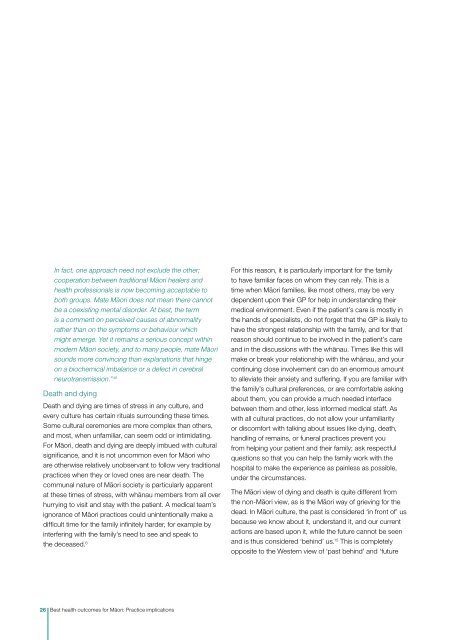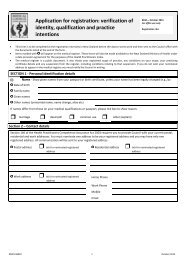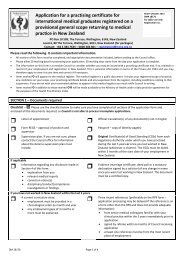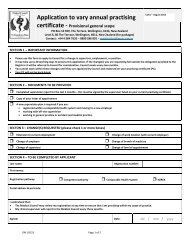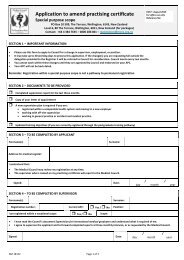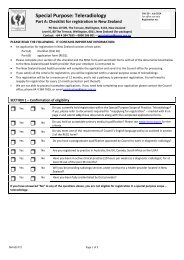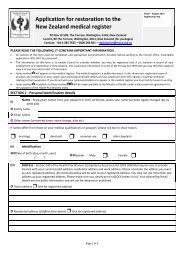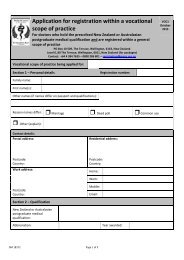Best health outcomes for Maori - Medical Council of New Zealand
Best health outcomes for Maori - Medical Council of New Zealand
Best health outcomes for Maori - Medical Council of New Zealand
You also want an ePaper? Increase the reach of your titles
YUMPU automatically turns print PDFs into web optimized ePapers that Google loves.
In fact, one approach need not exclude the other;<br />
cooperation between traditional Mäori healers and<br />
<strong>health</strong> pr<strong>of</strong>essionals is now becoming acceptable to<br />
both groups. Mate Mäori does not mean there cannot<br />
be a coexisting mental disorder. At best, the term<br />
is a comment on perceived causes <strong>of</strong> abnormality<br />
rather than on the symptoms or behaviour which<br />
might emerge. Yet it remains a serious concept within<br />
modern Mäori society, and to many people, mate Mäori<br />
sounds more convincing than explanations that hinge<br />
on a biochemical imbalance or a defect in cerebral<br />
neurotransmission.” 46<br />
Death and dying<br />
Death and dying are times <strong>of</strong> stress in any culture, and<br />
every culture has certain rituals surrounding these times.<br />
Some cultural ceremonies are more complex than others,<br />
and most, when unfamiliar, can seem odd or intimidating.<br />
For Mäori, death and dying are deeply imbued with cultural<br />
significance, and it is not uncommon even <strong>for</strong> Mäori who<br />
are otherwise relatively unobservant to follow very traditional<br />
practices when they or loved ones are near death. The<br />
communal nature <strong>of</strong> Mäori society is particularly apparent<br />
at these times <strong>of</strong> stress, with whänau members from all over<br />
hurrying to visit and stay with the patient. A medical team’s<br />
ignorance <strong>of</strong> Mäori practices could unintentionally make a<br />
difficult time <strong>for</strong> the family infinitely harder, <strong>for</strong> example by<br />
interfering with the family’s need to see and speak to<br />
the deceased. 6<br />
2 <strong>Best</strong> <strong>health</strong> <strong>outcomes</strong> <strong>for</strong> Mäori: Practice implications<br />
For this reason, it is particularly important <strong>for</strong> the family<br />
to have familiar faces on whom they can rely. This is a<br />
time when Mäori families, like most others, may be very<br />
dependent upon their GP <strong>for</strong> help in understanding their<br />
medical environment. Even if the patient’s care is mostly in<br />
the hands <strong>of</strong> specialists, do not <strong>for</strong>get that the GP is likely to<br />
have the strongest relationship with the family, and <strong>for</strong> that<br />
reason should continue to be involved in the patient’s care<br />
and in the discussions with the whänau. Times like this will<br />
make or break your relationship with the whänau, and your<br />
continuing close involvement can do an enormous amount<br />
to alleviate their anxiety and suffering. If you are familiar with<br />
the family’s cultural preferences, or are com<strong>for</strong>table asking<br />
about them, you can provide a much needed interface<br />
between them and other, less in<strong>for</strong>med medical staff. As<br />
with all cultural practices, do not allow your unfamiliarity<br />
or discom<strong>for</strong>t with talking about issues like dying, death,<br />
handling <strong>of</strong> remains, or funeral practices prevent you<br />
from helping your patient and their family; ask respectful<br />
questions so that you can help the family work with the<br />
hospital to make the experience as painless as possible,<br />
under the circumstances.<br />
The Mäori view <strong>of</strong> dying and death is quite different from<br />
the non-Mäori view, as is the Mäori way <strong>of</strong> grieving <strong>for</strong> the<br />
dead. In Mäori culture, the past is considered ‘in front <strong>of</strong>’ us<br />
because we know about it, understand it, and our current<br />
actions are based upon it, while the future cannot be seen<br />
and is thus considered ‘behind’ us. 15 This is completely<br />
opposite to the Western view <strong>of</strong> ‘past behind’ and ‘future


